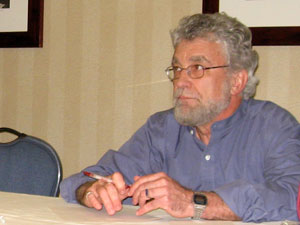
HAW at the AHA
San Diego, January 7-10, 2010
 What Went Wrong, and What Can Historians Do about It
What Went Wrong, and What Can Historians Do about It
HAW Panel at the 2010 American Historical Association Meeting
Andor Skotnes
The Sage Colleges, NY, and the HAW-SC
skotna@sage.edu
Introduction
On Saturday, January 9, 2010, Historians Against the War sponsored this panel at the AHA annual meeting (with the material support of our colleagues in the Radical History Review Editorial Collective). The panel was located at the AHA meeting’s second hotel, the San Diego Marriot, not at the meeting’s main hotel, the Manchester Grand Hyatt, because a coalition of local LGBT groups and HERE-UNITE were protesting at the latter.
HAW designed our AHA panel to promote a wide-ranging discussion among those attending over why Obama’s first presidential year has been so disappointing to many, and what actions historians can take to press the administration in a more progressive direction. To catalyze this discussion, we asked three historians to open our session with short statements. Unfortunately, Enrique Ochoa of Cal State-Los Angles had to drop out at the last minute. But Margaret Power, a historian of Latin America at the Illinois Institute of Technology (and a long time HAW leader), and Nelson Lichtenstein, a US working–class historian at UC Santa Barbara, made stimulating presentations. These presentations are reproduced below.
The discussion by the two-dozen or so in attendance following the presentations was lively and engaged, and combined disappointment (and anger) with determination. There was disagreement in the discussion over the degree to which the failings of the Obama administration were the result of contextual factors (the Bush years, economic collapse) or bad policy. Most felt that Obama’s failure (refusal?) to mobilize the base that elected him, and his reluctance to stand up to the right, were serious shortcomings. Everyone who spoke thought that his decision to escalate the war in Afghanistan was utterly disastrous. And those who spoke to the question thought it critical that the left mobilize more effectively to press the administration to the left. How to do this is, of course, the rub.
Toward the end of the session, HAW steering committee members suggested two approaches to action over the next few months that received evident support. First, it was proposed that HAW seek to ally more broadly and more closely with a range of anti-war and progressive forces, such as US Labor Against the War, Peace Action, the Peace History Association, Iraq Veterans Against the War, Veterans for Peace, and so on. Second, it was suggested that HAW call for locally based teach-ins and educationals, organized in coalition with local and national forces present on the ground, focusing on Obama’s wars, but also treating, as appropriate and possible, other issues of economic crisis and domestic reform. However, no real discussion of how these ideas might be implemented was possible; there was a sense that the HAW SC should take these up for possible implementation.
All in all, the HAW AHA session was successful in stimulating a useful discussion in a difficult time.
Nelson Lichtenstein, Obama’s First Year: Why His Administration Deserves a More Enthusiastic Endorsement from the Left
Margaret Power, The Effective Immorality of Torture: Linking Latin America to Afghanistan and the Middle East